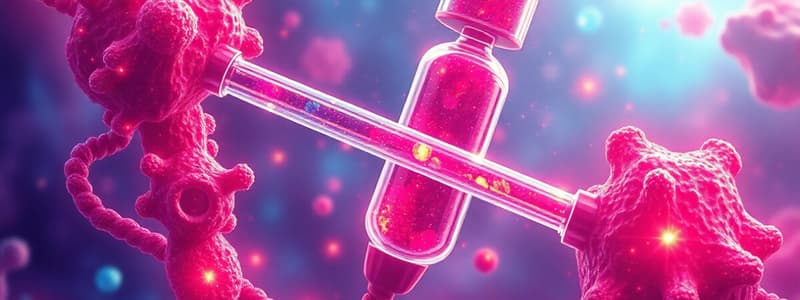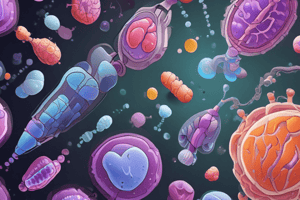Podcast
Questions and Answers
What characterizes type 1 diabetes in comparison to type 2 diabetes?
What characterizes type 1 diabetes in comparison to type 2 diabetes?
- Reliance on dietary modification instead of insulin
- Increased production of glucagon leading to hyperglycemia
- Absolute insulin deficiency due to pancreatic beta cell destruction (correct)
- Insulin resistance leading to decreased insulin levels
Which physiological processes are primarily inhibited by insulin?
Which physiological processes are primarily inhibited by insulin?
- Gluconeogenesis and glycogenolysis (correct)
- Glycogen synthesis and triglyceride storage
- Protein metabolism and ketogenesis
- Fat metabolism and protein synthesis
What are the diagnostic criteria for diabetes based on HbA1c levels?
What are the diagnostic criteria for diabetes based on HbA1c levels?
- HbA1c levels lower than 7.0%
- HbA1c levels equal to or greater than 6.0%
- HbA1c levels greater than 5.7%
- HbA1c levels greater than 6.5% (correct)
Which hormone is synthesized by the pancreas in response to elevated blood glucose levels?
Which hormone is synthesized by the pancreas in response to elevated blood glucose levels?
What is the definition of impaired glucose tolerance according to the oral glucose tolerance test?
What is the definition of impaired glucose tolerance according to the oral glucose tolerance test?
Which factor is NOT a characteristic of type 2 diabetes?
Which factor is NOT a characteristic of type 2 diabetes?
What triggers the synthesis of insulin in the pancreas?
What triggers the synthesis of insulin in the pancreas?
Which of these is a symptom commonly associated with diabetes?
Which of these is a symptom commonly associated with diabetes?
Which of the following best describes the metabolic effect of insulin on adipose tissue?
Which of the following best describes the metabolic effect of insulin on adipose tissue?
Which method is typically used to screen for diabetes mellitus?
Which method is typically used to screen for diabetes mellitus?
Study Notes
Diabetes Mellitus
- Definition: A chronic condition characterized by elevated blood sugar levels due to insufficient insulin production or resistance.
- Etymology: "Honey urine" from ancient Greek, referring to the sweet-tasting urine of individuals with the condition.
- Insulin Deficiency: Can be absolute, where the pancreas does not produce insulin, or relative, where the body does not effectively use the insulin it produces.
- Metabolic Impact: Affects the metabolism of carbohydrates, proteins, and fats.
Insulin Hormone
- Synthesis: Synthesized by beta cells in the pancreas in response to high blood glucose levels.
- Secretion: Pancreas secretes approximately 30 units of insulin daily, both basally and in response to meals.
- Proinsulin Cleavage: Proinsulin is cleaved into insulin and C-peptide, both of which are released from the pancreas.
- Insulin Clearance: Insulin is cleared from the body through both liver and kidney filtration.
Insulin Actions
- Liver: Anabolic effects, including glycogen synthesis, protein synthesis, and triglyceride synthesis. Anti-catabolic effect, inhibiting gluconeogenesis, ketogenesis, and glycogenolysis.
- Muscle: Promotes protein synthesis, glycogen synthesis, and glucose uptake.
- Adipose Tissue: Promotes triglyceride storage and inhibits lipolysis.
Diagnostic Criteria
- Symptoms: Polyuria (increased urination), polydipsia (increased thirst), and weight loss.
- Blood Glucose Levels:
- Fasting plasma glucose: Greater than 7.0 mmol/l.
- 2-hour plasma glucose: Greater than 11.1 mmol/l during a standard 75g oral glucose tolerance test.
- HbA1c (glycated hemoglobin): Greater than 6.5%.
- Impaired Fasting Glucose:
- Normal: Less than 5.6 mmol/l.
- Impaired: Between 5.6 mmol/l and 7.0 mmol/l.
Oral Glucose Tolerance Test
- Purpose: To diagnose impaired glucose tolerance or diabetes mellitus.
- Procedure: Patient ingests 75g of dextrose, and blood glucose levels are measured after 2 hours.
- Results:
- Impaired glucose tolerance: 2-hour glucose levels between 7.8 and 11.1 mmol/l.
- Diabetes mellitus: 2-hour glucose levels greater than 11.1 mmol/l.
Classification of Diabetes
- Type 1 Diabetes (Autoimmune and Idiopathic):
- Absolute insulin deficiency.
- Secondary to pancreatic beta cell destruction.
- Insulin-dependent for survival.
- Associated with anti-GAD antibodies.
- Type 2 Diabetes:
- Insulin resistance, leading to hyperinsulinemia.
- Beta cell dysfunction.
- Over 80% of cases associated with obesity.
- Can occur in non-obese individuals, often under 25 years old.
- Gestational Diabetes: Diabetes developing during pregnancy.
Studying That Suits You
Use AI to generate personalized quizzes and flashcards to suit your learning preferences.
Related Documents
Description
This quiz covers essential information about Diabetes Mellitus, focusing on its definition, etymology, and the role of insulin. Learn about the synthesis, secretion, and metabolic impacts of insulin as well as its relationship with blood sugar levels. Test your understanding of this important topic in human physiology and endocrinology.




